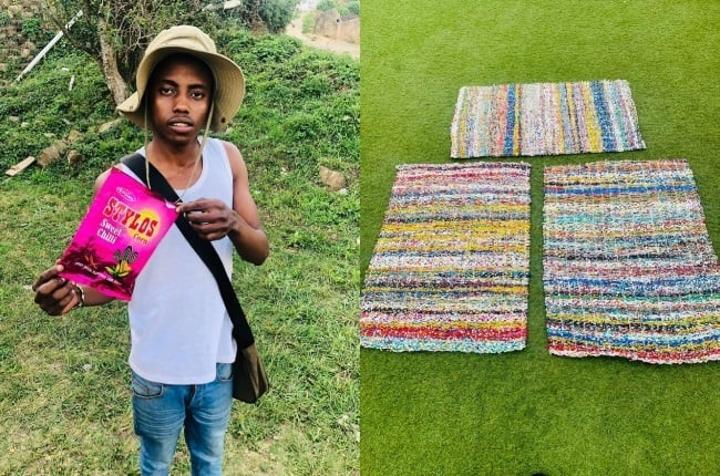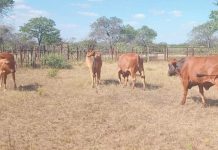Africa-Press – Zimbabwe. The colourful mats you’re looking at are not made from wool or cotton or any other fabric, nor were they sewn by machine.
They’re all plastic with just bits of thread holding them together.
Minenhle Simelane is the man who makes these mats from plastic waste he recycles from townships.
The mats can be used as decorative pieces on a sofa or a coffee table, or on the floor of any room.
Minenhle launched his mat business this year and his products have been sold all over the country. Most of his customers find him on Facebook.
The 23-year-old mat-maker, who lives in Umlazi, a township in KwaZulu-Natal, has sold his mats to customers living in the Free State and Gauteng.
“The largest order I received was from a customer on Facebook, when I first posted about the mats. That person wanted to buy 70 mats, but I couldn’t deliver as I work alone and I was still very new at it,” Minenhle tells YOU.
Each mat costs R100 and is up to 1,5m long. It takes the entrepreneur about three hours to make a single piece.
He makes the mats at his home, as he needs to clean the plastics after the collecting process. The mat-maker doesn’t only make the mats during the day, sometimes he works at night.
“I don’t use a lot of material; I just use the plastic I collect around the township. I wash the plastic, dry it and then join the pieces with needle and thread.
He uses all types of plastics, from chip packets to shopping bags. He has sold more than 80 mats.
“When I first started, I didn’t think it would turn into a business; I just saw something so beautiful and had to master the skill.”
Minenhle first made the mats when he was five, after his late maternal grandmother, Ntombizodwa Simelane, showed him how.
His paternal granny, Ngelosi Ngema, reintroduced him to mat-making this year when he went to visit her.
It took him two months to learn and master the skill, he recalls.
“When I came home from visiting my granny, some people saw me carrying the mats and complimented me on how beautiful they were. People asked for prices, but I told them I’m not selling them.”
Soon, he realised he could make money from the mats, and that’s when he decided to advertise on Facebook, kick-starting his business. His business officially launched in August when he first advertised on social media.
“For me, this is not only keeping the environment clean, but as I was unemployed, I’m now able to make money and support myself.
“Although I have a small tuck shop as well, these mats are my passion, and I enjoy making them because I am from an area where people my age turn to drugs and gangs. So, this is to keep myself from the streets.”
He works alone, although he would love to have others work with him, he tells us.
He’s been approached by other businesses who’ve asked him to teach their workers how to make the mats, but he’s turned them down, saying it would be a loss for his business.
“When I started this, it was to inspire my community and I do hope I can find people within the township who are interested in working with me. This is a very profitable business that doesn’t require you to spend a lot of money.
“I’m a person who loves the environment. As much as this is a business idea, for me, it is based on having a solution to protect the environment from pollution. The more my business grows, the more we will have clean townships,’’ he says.
“Our townships are heavily polluted by plastic waste. Whenever people are using plastics the only thing they do is dump them, not knowing that there are many more things you can make out of plastic waste than just polluting townships.”
His family are very supportive he says, especially his mom and his four younger siblings.
He was raised by his mother, Nompumelelo Simelane, and his maternal grandparents after his father, Sipho Ngema, passed away when Minenhle was four.
“I hope to expand my business and find sponsors that will invest in this business. I also plan on registering it as a company.”
For More News And Analysis About Zimbabwe Follow Africa-Press






